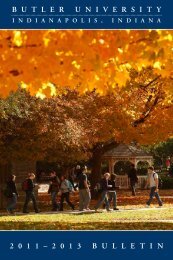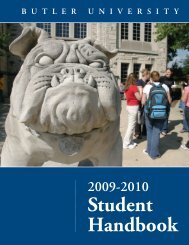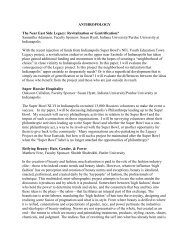The College of Pharmacy and Health Sciences - Butler University
The College of Pharmacy and Health Sciences - Butler University
The College of Pharmacy and Health Sciences - Butler University
You also want an ePaper? Increase the reach of your titles
YUMPU automatically turns print PDFs into web optimized ePapers that Google loves.
information to patients, fellow students,<br />
faculty, staff <strong>and</strong> all members <strong>of</strong> the health<br />
care team. Communication skills include<br />
speaking, reading <strong>and</strong> writing, as well as the<br />
observations skills described above.<br />
3. MOTOR: <strong>The</strong> c<strong>and</strong>idate/student must<br />
have sufficient motor function to elicit<br />
information from patients by palpation,<br />
auscultation, percussion <strong>and</strong> other diagnostic<br />
maneuvers, be able to perform basic laboratory<br />
tests, possess all skills necessary to carry out<br />
diagnostic procedures <strong>and</strong> be able to execute<br />
motor movements reasonably required to<br />
provide general care <strong>and</strong> emergency treatment<br />
to patients. <strong>The</strong> c<strong>and</strong>idate/student must<br />
possess the fine motor skills to perform the<br />
requirements <strong>of</strong> the pr<strong>of</strong>ession.<br />
4. INTELLECTUAL: <strong>The</strong> c<strong>and</strong>idate/student<br />
must be able to measure, calculate, reason,<br />
analyze <strong>and</strong> synthesize. Problem solving, the<br />
critical skills dem<strong>and</strong>ed <strong>of</strong> healthcare providers,<br />
requires all <strong>of</strong> these intellectual abilities. In<br />
addition, the c<strong>and</strong>idate/student must be able<br />
to comprehend three-dimensional relationships<br />
<strong>and</strong> to underst<strong>and</strong> the spatial relationships <strong>of</strong><br />
structures. <strong>The</strong> c<strong>and</strong>idate/student must have<br />
the capacity to perform these problem-<br />
solving skills in a timely fashion.<br />
5. BEHAVIORAL <strong>and</strong> SOCIAL ATTRIBUTES:<br />
<strong>The</strong> c<strong>and</strong>idate/student must possess the<br />
emotional health required for full utilization<br />
<strong>of</strong> his or her intellectual abilities, the exercise<br />
<strong>of</strong> good judgment, the prompt completion<br />
<strong>of</strong> all responsibilities attendant to the diagnosis<br />
<strong>and</strong> care <strong>of</strong> patients <strong>and</strong> others. C<strong>and</strong>idates/<br />
students must also be able to tolerate taxing<br />
workloads, function effectively under stress,<br />
adapt to changing environment, display<br />
flexibility, <strong>and</strong> learn to function in the face <strong>of</strong><br />
uncertainties inherent in the clinical problems<br />
<strong>of</strong> many patients. Compassion, integrity,<br />
concern for others, commitment <strong>and</strong> motivation<br />
are personal qualities which each c<strong>and</strong>idate/<br />
student should possess.<br />
Pre-pr<strong>of</strong>essional health<br />
sciences courses<br />
PX 100. <strong>Health</strong> <strong>Sciences</strong> Seminar: <strong>The</strong><br />
purpose <strong>of</strong> the course is to get students involved<br />
early with the college <strong>and</strong> their major <strong>and</strong> to<br />
develop success skills that are applicable to all<br />
future learning experiences. Emphasis is placed<br />
on use <strong>of</strong> campus resources, developing<br />
240<br />
<strong>Butler</strong> <strong>University</strong><br />
communication skills, <strong>and</strong> examining career<br />
choices <strong>and</strong> options. Requisite: This course<br />
is required <strong>of</strong> all COPHS students without a<br />
previous degree. Open to COPHS students<br />
only. (U)(1)<br />
PX 101. <strong>Health</strong> <strong>Sciences</strong> Seminar for<br />
Pre-PAs: <strong>The</strong> purpose <strong>of</strong> the course is to get<br />
students involved early with the college <strong>and</strong><br />
their major <strong>and</strong> to develop success skills that<br />
are applicable to all future learning experiences.<br />
Emphasis is placed on use <strong>of</strong> campus resources,<br />
developing communication skills, <strong>and</strong> examining<br />
career choices <strong>and</strong> options. Requisite: This<br />
course is required <strong>of</strong> all COPHS students<br />
without a previous degree. Open to COPHS<br />
pre-PA students only. (U)(1)(P/F)<br />
PX 200. Introduction to Pr<strong>of</strong>essional<br />
Practice: An introduction to current issues in<br />
pharmacy practice with an emphasis on the appreciation<br />
for how socioeconomic <strong>and</strong> cultural<br />
diversity influence patient access to health care<br />
<strong>and</strong> health care outcomes. Prerequisite: Second<br />
prepr<strong>of</strong>essional year st<strong>and</strong>ing in the doctor <strong>of</strong><br />
pharmacy program. (U)(1)<br />
PX 311. Human Anatomy for the <strong>Health</strong><br />
<strong>Sciences</strong>: This course discusses human anatomical<br />
composition <strong>and</strong> organization from the<br />
level <strong>of</strong> the atom to the level <strong>of</strong> the organism.<br />
Those aspects <strong>of</strong> anatomy required for the<br />
clinical education <strong>and</strong> practice are emphasized.<br />
Prerequisite: BI 105 or 110, or BI 100 for<br />
non-COPHS students. (U)(3)<br />
PX 315. Human Physiology for the <strong>Health</strong><br />
<strong>Sciences</strong>: A study <strong>of</strong> the functions <strong>of</strong> the<br />
human body emphasizing the actions <strong>and</strong><br />
regulation <strong>of</strong> the specific organs <strong>and</strong> organ<br />
systems, <strong>and</strong> how their performance is integrated<br />
in achieving homeostasis. Prerequisites: Human<br />
anatomy <strong>and</strong> organic chemistry, both with<br />
passing grades. (U)(4)<br />
PX 325. Ethical Issues in <strong>Health</strong> Care: This<br />
course will provide students with an awareness<br />
<strong>of</strong> current ethics issues in health care, <strong>and</strong> an<br />
appreciation <strong>of</strong> the gravity <strong>of</strong> these issues. <strong>The</strong><br />
associated body <strong>of</strong> knowledge will be discussed,<br />
<strong>and</strong> students will formally devise their own<br />
ethical position. (U)(3) Open to COPHS<br />
Pre-<strong>Pharmacy</strong> <strong>and</strong> <strong>Pharmacy</strong> students only or<br />
permission <strong>of</strong> instructor.

















